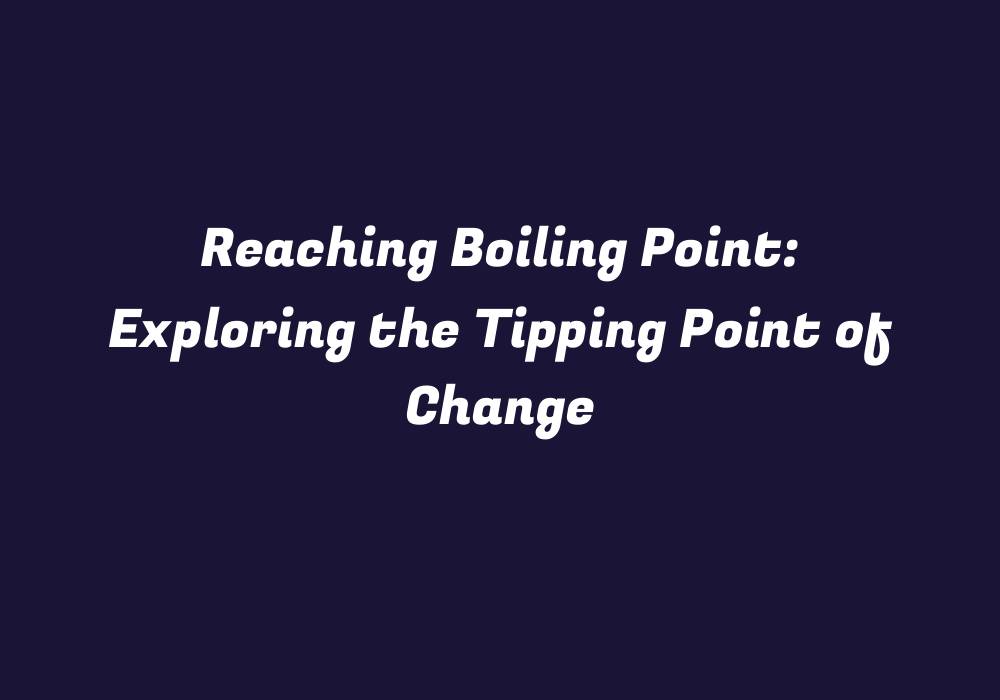Exploring the Tipping Point of Change: Reaching Boiling Point
Introduction: The Concept of Tipping Points
The term “tipping point” refers to the moment when a small change, whether positive or negative, triggers a significant transformation in a system’s behavior. This concept is widely recognized across various fields, including sociology, psychology, and even environmental science, where it plays an essential role in predicting ecological shifts. In recent years, this idea has gained relevance when discussing global climate change and understanding how minor adjustments in human behavior can lead to major consequences.
Global Warming: A Tipping Point of Change
As the Earth’s temperature continues to rise, we are approaching a tipping point where even minor changes could lead to catastrophic consequences for our planet and its inhabitants. Rising temperatures affect not only our environment but also human health, food security, and the stability of global economies. Despite being aware of these risks for several decades, humanity has been slow in taking decisive action to curb greenhouse gas emissions.
Climate Change Denial: A Major Obstacle
One of the significant challenges facing climate change efforts is the widespread denial of its existence by a segment of the population. The reluctance to acknowledge the issue has created an atmosphere of uncertainty and confusion, hindering collective progress towards addressing this global challenge. Climate skeptics often rely on misleading information or dismiss scientific evidence altogether in their attempt to discredit the overwhelming consensus among experts regarding climate change’s reality and severity.
Rising Temperatures: The Alarming Reality
The Intergovernmental Panel on Climate Change (IPCC) has been clear about the dangers posed by global warming, predicting that temperatures will rise more rapidly than previously anticipated if emissions continue at their current rate. As temperatures increase, so do the risks of severe weather events, such as heatwaves, droughts, and floods. These conditions could lead to significant disruption in human societies and ecosystems, with potentially devastating consequences for life on Earth.
Adapting to Climate Change: A Proactive Approach
While the goal should be to prevent the worst-case scenarios by mitigating greenhouse gas emissions, adapting to climate change is an essential part of our response strategy. This involves preparing for the inevitable impacts and developing strategies that allow us to continue living sustainably in a warmer world. By taking proactive measures now, we can build resilience and minimize potential damages from climate-related hazards.
Embracing Sustainability: A Necessary Shift
To avoid reaching the tipping point of change and to protect our planet’s future, humanity must embrace a sustainable way of life that prioritizes environmental protection, responsible resource management, and a focus on renewable energy sources. This shift requires concerted efforts from individuals, communities, governments, and businesses, collaborating to promote environmentally conscious practices.
Individual Actions: The Power of Small Changes
While large-scale change must come from policy makers and global organizations, individual actions can have a significant impact on reducing greenhouse gas emissions and slowing the pace of climate change. Consuming less, opting for energy-efficient appliances, embracing public transportation, and adopting vegan or plant-based diets are just a few examples of how each person’s choices can contribute to positive environmental outcomes.
Government Policies: Encouraging Sustainability
In addition to individual actions, governments must enact policies that promote sustainable development and encourage the transition towards clean energy sources. This could involve establishing carbon taxes, investing in renewable technologies, or supporting research into alternative energy solutions. By prioritizing environmental protection in their legislative agendas, governments can help accelerate global efforts to mitigate climate change impacts and prevent a catastrophic tipping point.
Conclusion: Balancing Progress and Preparedness
As we approach the boiling point of change, it is crucial for humanity to recognize the significance of the tipping point concept and work collaboratively towards creating a sustainable future. By addressing climate denial, adapting to climate change, promoting sustainability in our daily lives, and advocating for pro-environmental policies at all levels, we can prevent the worst consequences and secure a more resilient world for generations to come.
